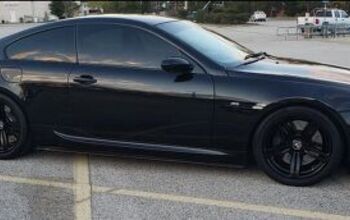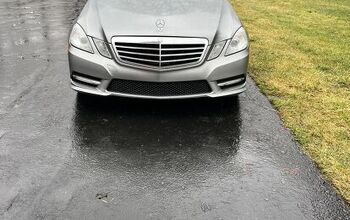China Spells Big Trouble For Japanese Automakers

The row between China and Japan over a few rocks in the East China Sea, alternately called Senkaku and Diaoyu islands, is threatening to derail production and sales plans of Japanese automakers. Many in the industry say that “Chinese consumers are unlikely to return to Japanese cars anytime soon,” as The Nikkei [sub] says. Already, Japanese automakers have curtailed production in and exports to China. The problem may not be a temporary one.
Chinese customers hold foreign brands in much higher regard than Chinese. Conspicuous consumption of foreign products is a signal of achievement. Contrary to lore that the Chinese prefer Buicks because a Chinese Emperor did so, the Chinese long preferred Japanese cars, a fact that clashes with clichés. Until recently, Japanese brands outsold all others in China, now they are in place two after being overtaken by the Germans.
That was before the Chinese riots over the rocks in the sea, that led to the smashing of Japanese-branded cars, torching of dealerships that sold them and attacks at factories that made them. Suddenly, ownership of a Japanese car means the worst of the worst in China: Loss of face.
Japanese automakers already are adjusting their output.
Toyota has decided to keep its Guangzhou plant, a joint venture with Guangzhou Auto, closed for an additional four days until it will be shut down for eight days for the October holidays, says the Nikkei. The plant makes the Camry and the Highlander. When it will reopen, the plant will go from two shifts to one.
According to the same report, Nissan will suspend production three days earlier than scheduled at three Chinese manufacturing facilities. Honda is considering going to one shift at its Guangzhou factory.
Reports by the Yomiuri Shimbun that Toyota did stop auto exports from Japan to China were discounted by a Toyota spokeswoman in Tokyo. “We are adjusting output, we did not stop it,” the spokesperson said.
While these outbursts in China tend to blow over faster than they started, market observers worry that Japanese brands have received a lasting and hurting dent in China. “When choosing between a Japanese or a German-branded car, both equal in terms of value, why would you buy a Japanese car when you see residents smashing them in such anti-Japan protests?” Song Jian, president of Tsinghua Institute for Automotive Technology, told Bloomberg. “It would definitely weigh on your buying decision.”
Koji Endo, auto analyst at Advanced Research Jaoan sees sales of Japanese brands go down by 20 to 30 percent,” Reuters reports. “The last time we had protests like this in 2010, the effects only lasted about a month, but I think this time is going to be different. This is going to have a serious impact,” Endo said. Smaller anti-Japanese protest in 2005 and 2010 were mostly for foreign consumption and either rarely noticed or mostly ignored by the Chinese population. Not so this time around.
Numerically, Nissan has the highest exposure in China with 1.25 million sales in 2011, and plans for much more in this and future years. Goldman Sachs figures that Nissan generates about 30 percent of its profit in China, compared with 17 percent at Toyota and 15 percent at Honda. Spokespeople at Nissan did not want to go on record, citing the sensitivity of the matter, but expressed hopes that business interests prevail.
Ironically, it is the Chinese government that is immediately hurt by these developments. Nearly all joint venture partners of Japanese carmakers are Chinese State-Owned Enterprises. A sudden shift in customer perception exacerbates problems with a slowing market. However, most of them have joint venture partners from other countries. In the case of Toyota, joint venture ;partner FAW is also a big partner of Volkswagen, and its Guangzhou partner signed on with Fiat. Honda’s and Nissan’s partner Dongfeng has JVs with Kia, and PSA Peugeot-Citroen. But it would not be as easy as making Volkswagens where one made Toyotas.

Bertel Schmitt comes back to journalism after taking a 35 year break in advertising and marketing. He ran and owned advertising agencies in Duesseldorf, Germany, and New York City. Volkswagen A.G. was Bertel's most important corporate account. Schmitt's advertising and marketing career touched many corners of the industry with a special focus on automotive products and services. Since 2004, he lives in Japan and China with his wife <a href="http://www.tomokoandbertel.com"> Tomoko </a>. Bertel Schmitt is a founding board member of the <a href="http://www.offshoresuperseries.com"> Offshore Super Series </a>, an American offshore powerboat racing organization. He is co-owner of the racing team Typhoon.
More by Bertel Schmitt
Latest Car Reviews
Read moreLatest Product Reviews
Read moreRecent Comments
- Ollicat Another Biden attempt to say, "Look over there!"
- Kjhkjlhkjhkljh kljhjkhjklhkjh Who cares. Price of gas is not the issue. spending an extra 100$ a month over 4 tanks of gas is not the issue.this a political scam to distract really dumb people from the real issue. if rent and house payments were not up by 50% to as high as 150% higher in a ton of locations, then paying an extra 100$ in gas would be annoying but not really an issue. But the real-estate market with hedge fund investors, power-relator groups bought a ton of houses and flipped them into rentals and jacked up the rates uplifting the costs on everything else. and ironically no-one seems to be in any hurry to build more houses to bring those costs down because supply and demand means keeping less houses available to charge as much as you want. It is also not the issue as a secondary issue is child care costs and medical... again 100$ extra per month in gas is *nothing* compared to 800$ a month in ''child care'' and 300$ per visit to the doctor office, 300$ for a procedure less dentist trip..
- Ajla Is there something proprietary or installed on the moon with these that I'm not aware of?
- Tane94 Awaiting the EV3 unveil this month. Kia continues to lead, though I will miss the Soul
- Jeanbaptiste I know this will never be seen, but the real answer is NO Government mandated tech. The reason why is that when the government mandates something, we miss out on signals that the free market will give to weather or not people actually want this or that this tech would actually help. It's like mandating AM radio for cars when people could just buy a $10 am radio if they really like am so much.

































Comments
Join the conversation
So it was and so it shall be. The circle of life continues. They're now going through the Japan bashing phase that the US went through in the 80's. Next comes whatever the equivalent of China bashing is for the Chinese. High probability it will be the U.S.
"Even though I am American I somehow managed to read the excerpts of Ahmadinejad’s latest tirade at the UN and drawing my own conclusions was greatly, if predictably, appalled." I think Americans overestimate Ahmadinejad's actual standing in Iranian politics. He makes a lot of noise, but domestically he actually doesn't have as much clout as one might think. The real power in Iran lies with the mullahs (ayatollahs). Also, he isn't all that popular; in the last election, his re-election victory was widely believed to be rigged and there were violent protests all over the results of the elections that had to be put down with police action. Ahmadinejad isn't running again, so he will pass from the scene soon.